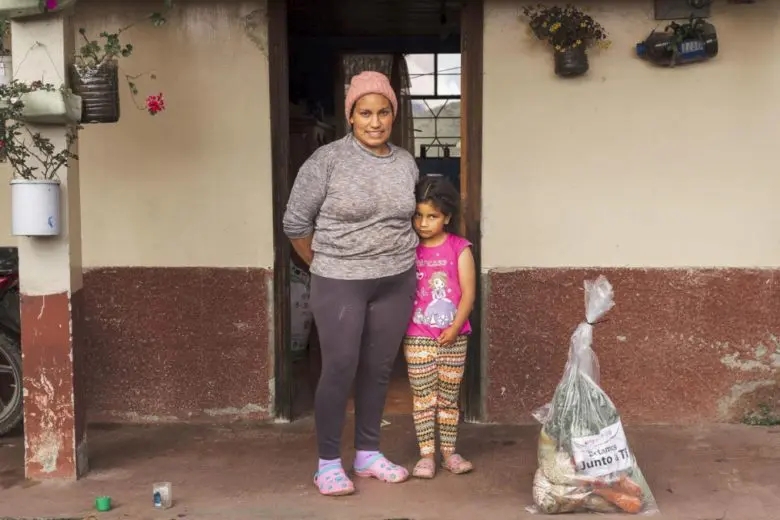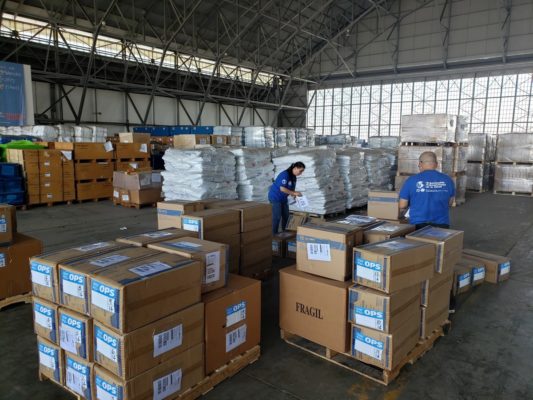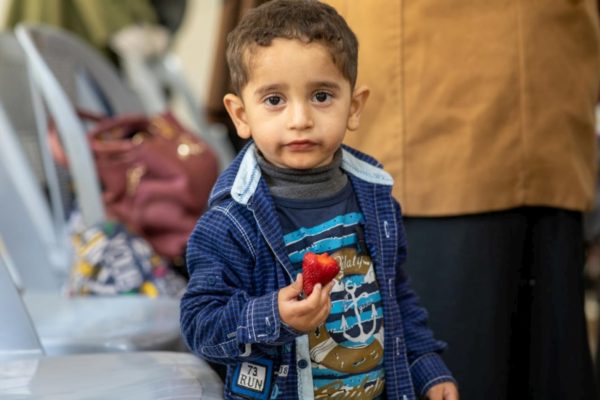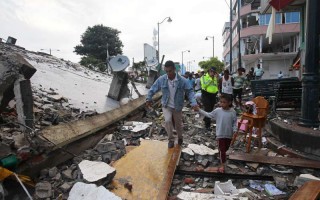
A Colombian refugee family in Heyleen in the Ecuadorian Andes receive UNHCR aid, 17 June 2020 © UNHCR/Sebastián Narváez
This is a summary of what was said by UNHCR spokesperson Shabia Mantoo – to whom quoted text may be attributed – at today’s press briefing at the Palais des Nations in Geneva.
Refugee community networks are helping detect COVID-19 cases in Ecuador, as part of a Community Epidemiological Surveillance System (CESS) developed by UNHCR, the UN Refugee Agency.
The system is helping ensure the early detection and referral for treatment of COVID-19 cases among the country’s refugee population. Since the system was launched a month ago, more than 250 suspected cases have been referred to national health authorities.
Although Ecuador grants access to public health services to all, regardless of nationality or residency status, access is not always immediate in practice. Some refugees are hosted in isolated and remote parts of the country with limited services while others may lack awareness of their rights or fear being fined for their irregular status.
This innovative, community health referral strategy relies on UNHCR’s pre-existing humanitarian and refugee community networks to help identify COVID-19 cases among refugee and migrant communities.
The network comprises partners, community organizations and civil society, complementing the Government’s existing Epidemiological Surveillance System to better reach refugees and migrants, who tend to move continuously within the country.
Nationwide six refugee and migrant-led community organizations have now been trained by UNHCR to conduct epidemiological surveillance.
Through telephone hotlines, home visits and in the delivery of humanitarian assistance, UNHCR staff as well as those of 50 other humanitarian and community-based organizations help monitor and identify suspected cases of COVID-19 among the refugee and migrant population and their local host communities.
Once suspected cases are identified by the community network focal point, the information is logged on an online private database and an alert is sent to public health services to follow up on the case and provide clinical treatment or advice as appropriate.
To date, more than 113,000 confirmed COVID cases have been reported among Ecuador’s 17 million inhabitants. Official figures record just over 500 COVID cases among refugees and migrants in the country.
Beyond the identification of symptoms, the Community Epidemiological Surveillance System also retrieves important information. It takes into account whether those referred have access to biosafety equipment, live in overcrowded accommodation, and have any other related needs or conditions that may require additional medical care – for example, pregnant women, older adults, and people with chronic diseases. This is key in enabling humanitarian organisations to provide tailored assistance.
UNHCR has also launched similar community health initiatives across Latin America, including in Colombia, Peru, Chile and Costa Rica.
Ecuador is home to nearly 70,000 recognized refugees, most from Colombia, in addition to some 400,000 refugees and migrants from Venezuela.
The impacts of the COVID-19 pandemic are now leaving many in dire conditions, without any sources of income, at risk of homelessness and with limited access to health and social services.
Data from the latest joint needs’ analysis run by Ecuador’s Working Group on Refugees and Migrants – which forms part of the Regional Inter-Agency Coordination Platform for Refugees and Migrants from Venezuela (R4V) – shows that 20 per cent of Venezuelans surveyed with medical problems could not access healthcare and 8 out of 10 surveyed households were unemployed.
UNHCR is calling for international support to help refugee-host countries, severely affected by the COVID-19 pandemic, respond to this emergency in an inclusive manner.
For more information on this topic, please contact:
- In Quito, Ilaria Rapido, rapido@unhcr.org, + 593 98 430 8666
- In Panama City, William Spindler, spindler@unhcr.org, + 507 638 27 815
- In Panama City, Olga Sarrado, sarrado@unhcr.org, + 507 664 00 185
- In Geneva, Shabia Mantoo, mantoo@unhcr.org, + 41 79 337 7650
Originally published by UNHCR on 01 September 2020





